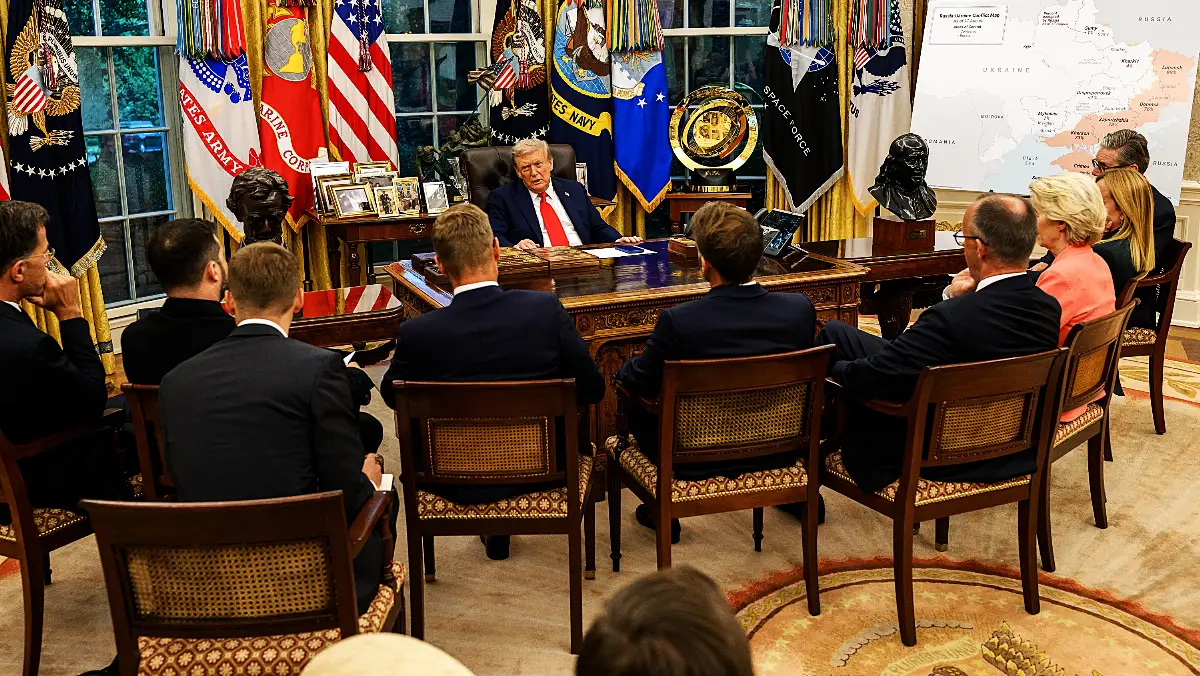
Russo-Ukrainian War (2). Washington Summit, the diplomatic showdown
Europe united, Moscow watches cautiously

World leaders are discussing a possible peace plan. Trump and Zelensky set out divergent positions but signal openness to new negotiations
An atmosphere charged with anticipation enveloped the international summit in Washington held yesterday (see AVIONEWS), where top world leaders confronted the Ukrainian crisis. The meeting, organized at the initiative of US President Donald Trump, featured Ukrainian President Volodymyr Zelensky and representatives of European governments as the main protagonists, marking a decisive turning point in the search for a diplomatic solution. The statements emerging from the various delegations painted a picture of willingness to negotiate, but also of deep divisions that make the path toward peace still uncertain.
Statements by Trump and Zelensky: a difficult dialogue
Donald Trump, in his opening remarks, reiterated his firm belief that diplomacy is the only way to end the conflict. "We spoke at length, and all of us know that the war must end", he said. "Saving human lives is our number one priority, and that means everyone must take a step back, everyone must make concessions to reach an agreement. You cannot have peace without compromise". The words of Trump, as his spokeswoman emphasized in a subsequent statement, aim to lay the groundwork for direct negotiations between the parties, although the reference to mutual concessions raised some misgivings among Kyiv’s allies.
For his part, Ukrainian President Zelensky gave a passionate and direct speech. "Sovereignty is non-negotiable. Our territorial integrity is a principle we cannot sacrifice", he declared. While acknowledging the need to find a solution, he warned that "compromise cannot and must not be confused with capitulation". He reiterated the demand for a complete withdrawal of Russian troops and thanked allies for their support, forcefully requesting stronger long-term security guarantees for Ukraine once hostilities end.
Europe’s unified position and Moscow’s reaction
The European leaders present at the summit expressed a unified position. German Chancellor Friedrich Merz, in an interview at the end of the talks, stated that "support for Ukraine is not in question. Our security cannot depend on the outcome of a conflict in which a sovereign country has been attacked. Guarantees for Kyiv are essential for the future stability of the continent". French President Emmanuel Macron reiterated the importance of a "just and lasting peace that respects international law".
Russia’s Foreign Ministry issued an official reaction, despite the absence of a Russian representative at the Washington summit. A press release described the talks as "an interesting initiative", but cautioned that "rhetoric about a presumed superiority of Western principles is an insurmountable obstacle to constructive dialogue". Moscow reaffirmed its willingness to negotiate, but only if the "realities on the ground", including territorial annexations, are taken into account. The statement, while appearing a partial opening, confirms that the initial positions remain irreconcilable.
Prospects and next steps
The Washington summit did not produce a formal agreement, but it established a platform for the next steps. The priority now is organizing a bilateral meeting between Putin and Zelensky, which, according to US diplomatic sources, could take place in the coming weeks—rumored by August, perhaps in Turkey. If it materializes, this meeting could be the first real litmus test of Trump’s mediation efforts. The road to peace remains uphill. Trump’s call for concessions and Zelensky on territorial integrity indicate that leaders will have to navigate turbulent waters. The outcome of yesterday’s summit in Washington is not peace, but the start of a diplomatic process that, for the first time, seems to have the potential for a direct and honest confrontation.
AVIONEWS - World Aeronautical Press Agency